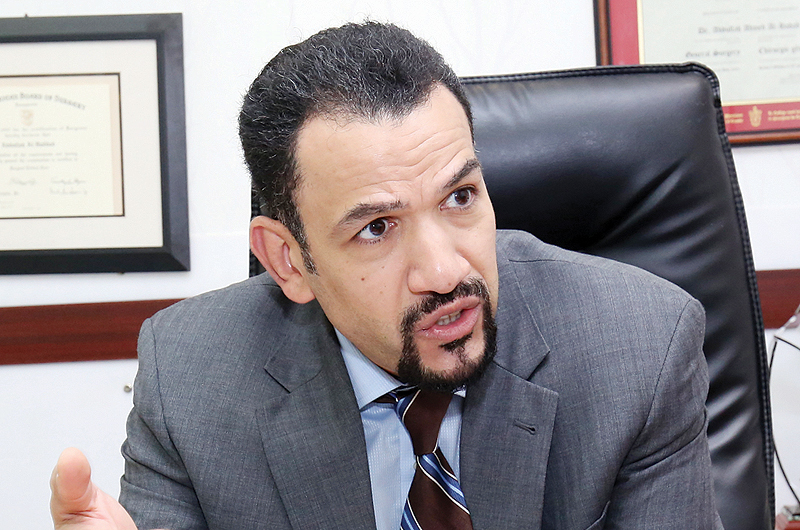'If you are 40 years old and above, please undergo screening of the colon'
KUWAIT: Colorectal cancer is the number one cause of death for middle-aged men and number two for middle-aged women in Kuwait, according to Dr Abdullah Al-Haddad, consultant general laparoscopic surgeon at Dar Al-Shifa Hospital. The finding was based on ministry of health records released recently. He advised men and women in Kuwait to undergo colonoscopies or any examinations available for patients aged over 40. "If you are 40 years old and above, please undergo screening of the colon so as to help prevent the spread of colon cancer. Colon cancer is preventable, and in order to make this happen, we need to educate the public - early detection is the key," he said.
Colorectal cancer, also known as bowel cancer, colon cancer or rectal cancer, is any cancer that affects the colon and the rectum. In the US, it is estimated that about 1 in 21 men and 1 in 23 women will develop colorectal cancer during their lifetime. Most colorectal cancers begin as small, non-cancerous growths known as polyps, which are attached to the inner wall of the colon. Over time, these polyps can slowly develop into cancer over a period of 10-20 years.
Haddad explained that in order to prevent and treat colon cancer, one must know their colon condition, adding procedures being done at Dar Al-Shifa can help patients. He pointed out that colon cancer is more prevalent nowadays because of the lifestyle, poor eating habits of most people and the regular intake of processed, fatty and junk food.

'It's good to be checked'
The symptoms of colorectal cancer, according to Dr Haddad, include changes in bowel habits, diarrhea or constipation, a feeling that the bowel does not empty properly after a bowel movement, stools that look black which is actually because of blood, bright red blood coming from the rectum, pain and bloating in the abdomen, a feeling of fullness in the abdomen even after not eating for a while, fatigue or tiredness, unexplained weight loss, a lump in the abdomen or the back passage felt by your doctor, and unexplained iron deficiency in men, or in women after menopause.
"It's good to be checked so that if it's not related to colon cancer, probably we can detect some other condition, which in a way is a blessing in disguise. We can manage any more medical conditions. So if you are 40 up, consult any laparoscopic doctor so as to help prevent the spread of colon cancer. It is very important to see a doctor if symptoms persist for four weeks or more. The age risk of being affected by color cancer has been lowered from 50 years to 40 now," Haddad added.
Dar Al-Shifa Hospital, together with the support of public hospitals in Kuwait, marked a campaign called 'Beat Colorectal Cancer" during the entire month of March. "The campaign concluded yesterday and we were very successful on all fronts. But it doesn't mean it's the end of the campaign to educate people - as a matter of fact, we are just beginning," Haddad said.
Dr Haddad said early detection can eliminate cancer one hundred percent. "If it is already a stage one or two cancer, it can also be removed through modern technology now. If it's stage three or four, the patient has to undergo chemotherapy, with about a 60 percent rate of survival if detected. Don't wait for stage four as it will be very difficult for doctors to treat it. The main idea is to prevent any cancer from developing, and perhaps avoiding foods that can trigger colon cancer," he said. Treatment available includes surgery, chemotherapy, radiation therapy, targeted drug therapy and immunotherapy.
By Ben Garcia










